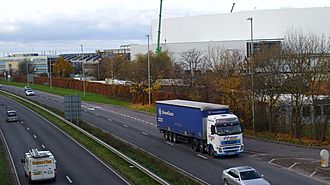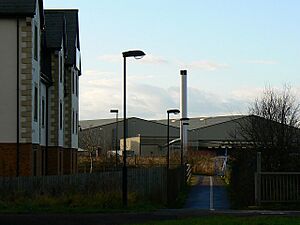Unilever Gloucester facts for kids
Quick facts for kids Unilever Gloucester |
|
|---|---|
|
Unilever Ice Cream, Gloucester Factory
|
|

Looking north-west from the footbridge over the A417 (for the Premier Inn Gloucester) in November 2008
|
|
| Former names | Cotswold Factory |
| General information | |
| Type | Ice cream factory |
| Architectural style | Factory |
| Address | Corinium Avenue, Barnwood, Gloucestershire, GL4 3BW |
| Coordinates | 51°52′01″N 2°12′05″W / 51.867°N 2.2014°W |
| Elevation | 25 m (82 ft) |
| Current tenants | 500 staff |
| Construction started | 1959 |
| Completed | 1962 |
| Cost | £4m (1962) |
| Client | Unilever |
| Owner | Unilever UK |
| Dimensions | |
| Other dimensions | 74 acres |
The Unilever Gloucester factory is a huge place in Gloucester, England, where all of Unilever's ice cream for the UK is made. It's a very important factory for making your favorite frozen treats!
Contents
History of the Factory
Building the Ice Cream Home
Unilever started building this factory in 1959. It was officially announced on April 16, 1962. Before this, Unilever didn't make ice cream during World War II.
Gloucester was chosen because a big aircraft company there had recently closed. This meant there were people looking for jobs. Construction began in February 1959. Unilever used to make ice cream in other places like Edinburgh and London, but they couldn't make enough.
The new factory had a giant cold storage area next door. It was as big as a football pitch! This huge freezer could hold 750,000 gallons of ice cream. Imagine how much ice cream that is!
The factory used a lot of ingredients. Each week, it needed 53,000 gallons of milk and 20,000 gallons of liquid sugar. It also used 25 tonnes of butter. The part of the factory that made wafers could produce one billion wafers every year.
Making Ice Cream for the World
Unilever is the biggest ice cream maker in the world. They have other large factories in places like the Netherlands, France, and Italy.
The Gloucester factory was built to supply ice cream to 25 million people. This included people in the west and north of England, and all of Wales. In the 1960s, over 1,000 people worked there. It was known as the world's largest ice cream factory! When it first opened, it could make 90,000 gallons of ice cream and 2 million ice lollies every single day.
Big Changes in the 1980s
In the late 1980s, a lot of money was spent to make the factory even better. Over five years, about £60 million was invested.
In the mid-1980s, another £45 million was spent. This was to bring all of Unilever's UK ice cream making to the Gloucester plant. This made it the biggest ice cream factory in Europe. Other factories in Acton and Eastbourne closed down.
A brand new factory, called the Phoenix Factory, was built for £42 million. It opened in July 1987 and added 300 more staff members.
The 1990s and New Ice Creams
By the 1990s, the factory site had grown to 74 acres. About 1,200 people worked there. In 1993, the factory used 150 million litres of milk each year. It could make 340 Mini Milk lollies every minute!
In the early 1990s, another company, Mars UK, started making ice cream. This made Unilever want to create something new and better. So, they developed the Magnum ice cream. Some people at Unilever weren't sure if customers would pay more for it, because it used Belgian chocolate and real dairy ice cream. But Magnum became the UK's best-selling ice cream in just one year! It has been popular for over thirty years.
Later, Unilever also started making Ben & Jerry's ice cream at the factory. This happened after Unilever bought the Ben & Jerry's company in April 2000.
The Gloucester factory was one of the biggest in Europe. It could make more than 100 million litres of ice cream each year. It produced 110,000 tonnes of ice cream annually.
In 1996, another company, Nestlé, had a disagreement with Unilever about how ice cream was sold. They felt Unilever had special deals that gave them a big share of the UK ice cream market. This led to an investigation that started in July 1997.
In late 1997, the original part of the factory, called the Cotswold factory, closed. This part used to make the popular Arctic roll. The factory was updated with new machines and technology.
From January 1998, the factory started working on weekends too. Before that, it only operated from Monday to Friday.
Important Visitors
Many important people have visited the Unilever Gloucester factory over the years:
- In May 1963, nine Members of Parliament (MPs) visited.
- In November 1963, a large group from the TUC General Congress came to see the factory.
- A group from the World Health Organization (WHO) visited in November 1964.
- In June 1987, a 12-year-old girl named Elizabeth Spooner visited as part of a TV show called Jim'll Fix It. Her visit was shown on TV in January 1988.
- Government ministers like Douglas Hogg (in May 1990) and David Maclean, Baron Blencathra (in January 1992) also visited.
- Union leader Bill Jordan, Baron Jordan visited in July 1994.
- Food minister Frederick Curzon, 7th Earl Howe visited in January 1995.
- A very special visit happened on Friday, March 3, 1995. The Queen and the Duke of Edinburgh came to the factory! The Queen even planted a special tree there.
- In May 1997, the Bishop of Gloucester, David Bentley, visited for three hours with his wife.
- In 2015, the factory was shown in a TV documentary about milk production on BBC2. The show featured how Magnum ice creams are made.
- In 2022, the factory's production was shown in a Channel 4 documentary called The Secret World of Ice Cream.
People Who Worked There
- In the 1960s, Robert Dayer-Smith was a manager.
- In the 1980s, John Gore Hazelwood was a manager. He received a special award called the CBE in 1994.
- Stuart Lowthian became a manager in May 1997.
- Sigismund Herschdörfer was the chief chemist for T.Wall & Son (a part of Unilever) in the 1950s and 60s. He was responsible for bringing new techniques to the Gloucester factory.
How the Factory Works
In the 1960s, the factory had office buildings and production areas. There was also a separate factory called Embisco that made cones and wafers. The factory was first known as the Cotswold Factory.
Today, the factory runs 24 hours a day, every day of the week. It is located near a main road, the A417, and close to the M5 motorway. It also sits next to a main railway line.
Over 500 people work at the factory.
What They Produce
The factory makes a huge amount of ice cream! It produces about 5 million Cornetto products and 10 million Magnum products every week. That adds up to around 1.5 billion ice cream products each year!
By 1995, it was the second-largest ice cream producer for Unilever. With more production lines, it became the world's largest ice cream plant in 1996.
In 1997, about 30% of the ice cream made at the Gloucester factory was sent to other countries. For example, 33 tons of 'Romantica' ice cream were sent to Germany every three days.
The factory has made many different ice cream products:
- Cornetto production started in July 1976.
- The Arctic roll was made there after production moved from another factory.
- In March 1994, the factory started making chocolate ice creams for Cadbury.
- In 1996, new developments allowed the factory to make frozen bakery items, like croissants.
See also
- Arla Aylesbury
- Fruit and Vegetable Preservation Research Station, also in Gloucestershire
- Company Profile, Dun and Bradstreet
- Company Profile - Bloomberg


